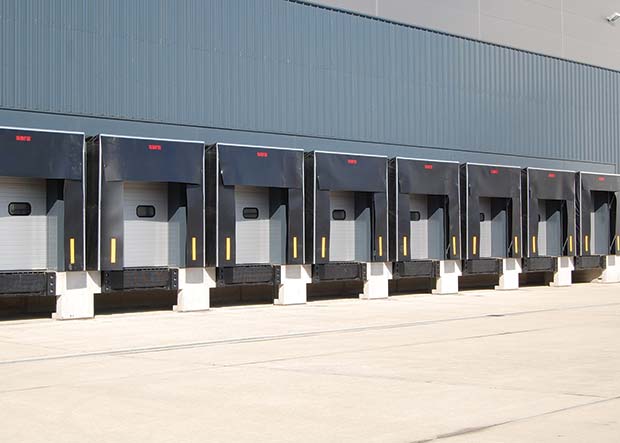Dock shelters and seals play a big role in maintaining efficiency and saving energy in warehouses with internal loading/unloading bays. But with various options to choose from which is right for a given application? Guy Windle of sara LBS examines the relative merits of standard, retractable and inflatable dock shelters.
 The unpredictability of British weather means that, every day, opening a door is a journey into the unknown. For a busy warehouse, the challenges of maintaining a given ambient temperature can be severe, with heat loss – or heat ingress. From a thermal efficiency perspective, every time the loading bay doors are opened, it is potentially costing you money.
The unpredictability of British weather means that, every day, opening a door is a journey into the unknown. For a busy warehouse, the challenges of maintaining a given ambient temperature can be severe, with heat loss – or heat ingress. From a thermal efficiency perspective, every time the loading bay doors are opened, it is potentially costing you money.
It is no surprise, then, that dock shelters have become a popular option as the interface between the warehouse and the lorry. Rugged and robust, they form an effective seal against the lorry during loading and unloading, and reduce heat/chill loss from thermally regulated premises or vehicles.
Heavy duty by design and extremely cost effective when considered against the energy savings, dock shelters offer a low maintenance solution to sealing the gap between loading bay and the vehicle. Curtains protect goods from the weather and help to maintain warehouse temperature.
When looking at a dock shelter for a given application, there are three primary options: rigid, retractable and inflatable. The standard, rigid dock shelter is designed to allow unobstructed access to the rear of the vehicle for easy loading or unloading. They provide good allround protection from the outside elements, employing two vertical side curtains and a horizontal head curtain to provide an effective seal against the vehicle.
The same benefits are also provided by retractable dock shelters, but these offer the advantage of folding back if struck by a vehicle. This not only reduces the possibility of impact damage, but also ensures an effective seal is established. Once the vehicle leaves the bay the shelter will return to its original position.
The third option is the inflatable model. Here, once the vehicle is docked at the shelter, the side and head curtains are inflated to provide a weather-tight, energy-efficient seal against the vehicle.
Inflatable dock seals provide an excellent solution for warehouses working with a wide range of vehicle heights. Hygiene regulations are catered for, and the internal retraction system for the side air bags gives a smart and tidy appearance.
A typical system takes around ten seconds to inflate and seal against the vehicle, and importantly it offers an effective seal without putting any major loading on the building. This means the inflatable dock shelter is suitable for use on buildings with a light duty construction.
Having spotted early on an increased demand for this highquality type of seal, sara LBS is at the forefront of inflatable dock shelter design, with three distinct models.
The first includes fully insulated side panels to meet current hygiene regulations with head frame finished in white Plastisol steel and sloping rear-to-front roof for drainage. Side storage curtains in black 3.5mm thick PVC for air bag protection secured by aluminium angle around three sides.
The second inflatable model is narrower in overall width to allow for more units on interface but without fixed side panels to assist vehicle movement. Air bags inflate directly from wall position behind the buffer line and are designed to seal the gap between vehicle door hinges.
The third is designed to allow side air bags to inflate direct from the building to totally enclose the vehicle rear and seal on vehicle sides. The insulated roof and the design of the deflated air bags bring an important benefit in the vehicles can have maximum manoeuvring space on entry and exit.
For any business with regular warehouse loading and unloading, the dock shelter is an important consideration. For the warehouse to be thermally efficient, hygienically safe and operationally productive, businesses need to get the choice of dock shelter right. With a full range of solutions to meet the needs of any application, the experts at sara LBS are always happy to advise on the right product to best meet individual requirements.
SARA




Comments are closed.